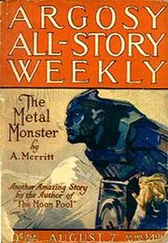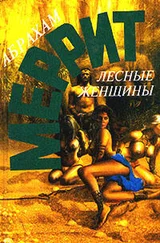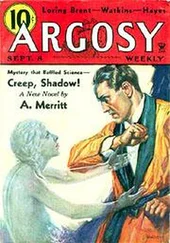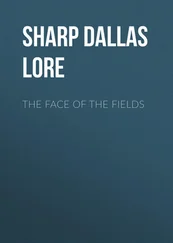Абрахам Меррит - The Face In The Abyss
Здесь есть возможность читать онлайн «Абрахам Меррит - The Face In The Abyss» весь текст электронной книги совершенно бесплатно (целиком полную версию без сокращений). В некоторых случаях можно слушать аудио, скачать через торрент в формате fb2 и присутствует краткое содержание. Год выпуска: 2014, Издательство: epubBooks Classics, Жанр: Фэнтези, Фантастика и фэнтези, на английском языке. Описание произведения, (предисловие) а так же отзывы посетителей доступны на портале библиотеки ЛибКат.
- Название:The Face In The Abyss
- Автор:
- Издательство:epubBooks Classics
- Жанр:
- Год:2014
- ISBN:нет данных
- Рейтинг книги:5 / 5. Голосов: 1
-
Избранное:Добавить в избранное
- Отзывы:
-
Ваша оценка:
- 100
- 1
- 2
- 3
- 4
- 5
The Face In The Abyss: краткое содержание, описание и аннотация
Предлагаем к чтению аннотацию, описание, краткое содержание или предисловие (зависит от того, что написал сам автор книги «The Face In The Abyss»). Если вы не нашли необходимую информацию о книге — напишите в комментариях, мы постараемся отыскать её.
The Face In The Abyss — читать онлайн бесплатно полную книгу (весь текст) целиком
Ниже представлен текст книги, разбитый по страницам. Система сохранения места последней прочитанной страницы, позволяет с удобством читать онлайн бесплатно книгу «The Face In The Abyss», без необходимости каждый раз заново искать на чём Вы остановились. Поставьте закладку, и сможете в любой момент перейти на страницу, на которой закончили чтение.
Интервал:
Закладка:
He could see the spume of the cataract, torn into tattered banners by the wind. The caverns of the colossi were like immense eyes in the brown face of the precipice. The figure of the Frog–woman was plain, the green stone of which she was carved standing out in relief against the ochreous rock.
And there was the white, exquisite shape which guarded the cavern of the dead.
There was another colossus, cut, it seemed, from rosequartz, shrouded to the feet, its face hidden behind an uplifted arm; and there was a Cyclopean statue of one of the gray and hairless ape–men. These stood out clearly, the outlines of the other he could not distinguish for their color merged into that of the cliffs.
At his left, the meadow changed to a level plain, sparsely wooded, running for miles into the first wave of the forest, and checkered by the little farms of the Indians. At his right was the ancient city and, now seen so closely, less like a city than a park.
Where the city halted at the edge of the Temple's flowering mead, and halfway to the lake, was a singular structure. It was shaped like an enormous shell whose base had been buried to hold it upright; its sides curved gracefully, drawing closer in two broad, descending arcs, then flaring out to form an entrance. It faced the Temple, and from where he stood Graydon could see practically all of the interior.
This shell–like building was made of some opaline stone. Here and there within it glowed patches of peacock fires of the Mexican opal's matrix, and here and there were starry points of blue like those which shine from the black opal. The reflected rays from them appeared to meet in the center of the structure, stretching across it like a nebulous curtain. And, like a shell, its surface was fluted. The grooves were cut across, two–thirds from the top, by tier upon tier of stoneseats. Its top was all of three hundred feet high, its length perhaps thrice that. He wondered what could be its use.
He looked again over the city. If Lantlu were preparing an attack, there was no evidence of it. Along the broad avenue skirting the lake was tranquil movement, Indians going about their businesses, the glint of jeweled litters borne on the shoulders of others; a small fleet of boats with gayly colored sails and resembling feluccas skimmed over the water. There was no marching of armed men, no sign of excitement. He watched laden llamas swinging along, and smaller deer–like animals, grazing. The flowering trees and shrubs hid the lanes threading the grounds of the palaces. Then he had been summoned to the Serpent– woman. Graydon followed the messenger. They paused before a curtained recess; the Indian touched a golden bell set in the wall. The hangings parted.
He was on the threshold of a roomy chamber, through whose high, oval windows the sunlight streamed. Tapestries covered its walls, woven with scenes from the life of the serpent–people. Upon a low dais, her coils curled within a nest of cushions, was the Snake Mother. Behind her was Suarra, brushing her hair. The sun made round it a halo of silver. At her side squatted the Lord of Folly in his cloak of red and yellow. Suarra's eyes brightened as he entered, dwelling upon him tenderly. He made obeisance to Adana, bowed low to the Lord in motley.
"You look well in my blue, Graydon," lisped the Serpent–woman. "You haven't the beauty of the Old Race, naturally. But Suarra doesn't mind that," she glanced slyly at the girl.
"I think him very beautiful," said Suarra, quite shamelessly.
"Well, I myself find him interesting," trilled Adana, "after all these centuries, the men of Yu–Atlanchi have become a bit monotonous. Come and sit beside me, child," she motioned toward a long, low coffer close to her. "Take a pillow or two and be comfortable. Now tell me about your world. Don't bother about your wars or gods—they've been the same for a hundred thousand years. Tell me how you live, how you amuse yourselves, what your cities are like, how you get about, what you have learned."
Graydon felt this to be a rather large order, but he did his best. He ended almost an hour later, feeling that he had made a frightful jumble of skyscrapers and motion pictures, railroads and steamships, hospitals, radios, electricity and airplanes, newspapers and television, astronomy, art and telephones, germs, high–explosives and arc lights, he tripped on the electronic theory, bogged hopelessly on relativity, gulped and wiped a wet forehead. Also he had been unable to find Aymara words to describe many things, and had been forced to use the English terms.
But Adana had seemed to follow him easily, interrupting him seldom, and then only with extremely pointed questions.
Suarra, he was sure, had been left hopelessly behind; he was equally sure that the Lord of Folly had kept pace with him. The Serpent–woman had seemed a little startled by the airplanes and television, much interested in skyscrapers, telephones, high–explosives and electric lighting.
"A very clear picture," she said. "And truly amazing progress for—a hundred years, I think you said, Graydon. Soon, I should think, you would do away with some of your crudities—learn to produce light from the stone, as we did, and by releasing it from air. I am truly concerned about your flying machines, much concerned. If Nimir wins, they may soar over Yu–Atlanchi and welcome! If he does not—then I shall have to devise means to discourage any such visits. Truly! I am not so enamored with your civilization, as you describe it, to wish it extended here. For one thing, I think you are building too rapidly outside yourselves, and too slowly inside. Thought, my child, is quite as powerful a force as any you have named, and better controlled, since you generate it within yourself. You seem never to have considered it objectively. Some day you will find yourselves so far buried within your machines that you will not be able to find a way out—or discover yourself being carried helplessly away by them. But then I suppose you believe you have within you an immortal something which, when the time comes, can float out of anything into a perfect other world?"
"Many do," he answered. "I did not. But I find my disbelief shaken— once by something I saw in the Cavern of the Face, once by a certain dream while I slept beside a stream, and later found was no dream—and again by a whispering Shadow. If there is not something to man besides body—then what were they?"
"Did you think it was that immortal part of me which you saw in the Cavern? Did you think that, really?" she leaned forward, smiling. "But that is too childish, Graydon. Surely my ethereal essence, if I have it, is not a mere shadowy duplication! Such a wonderful thing should be at least twice as beautiful! And different—oh, surely different! I am a woman, Graydon, and would dearly like to try a few new fashions in appearance."
It was not until after he had left her that he recalled how intently the Serpent–woman had looked at him when she said this. If she thought something was within his mind—some reservation, some doubt—she was satisfied with what she found, or did not find. She laughed; then grew grave.
"Nor did anything of you rush forth from your body at my call. It was my thought that touched you beside the brook; my thought that narrowed the space between us—precisely as your harnessed force penetrates all obstacles and carries to you a distant picture. I saw you there, but it pleased me to let you see me as well. So it was that I watched Lantlu march into the Temple. Once we of the Older Race could send the seeing thought around the world, even as you are on the verge of doing with your machines. But I have used the power so little, for so long and long and long again, that now I can barely send it to the frontiers of Yu–Atlanchi.
"And as for Nimir—" she hesitated. "Well, he was master of strange arts. A pioneer, in a fashion. What this Shadow is—I do not know. But I do not believe it is any immortal—what do you name it, Graydon—ah, yes, soul. Not his soul! And yet—there must be a beginning in everything…perhaps Nimir is pioneer in soul making…who knows! But if so—why is it so weak? For compared to that which was Nimir in body this Shadow is weak. No, no! It is some product of thought; an emanation from what once was Nimir whom we fettered in the Face…a disembodied intelligence, able to manipulate the particles that formed the body of Cadok—that far I will go…but an immortal soul? No!" She dropped into one of her silences; withdrawn—then—"But the seeing thought, I do know, I will show you, Graydon—will send my sight into that place where you saw the ship, and yours shall accompany it."
Читать дальшеИнтервал:
Закладка:
Похожие книги на «The Face In The Abyss»
Представляем Вашему вниманию похожие книги на «The Face In The Abyss» списком для выбора. Мы отобрали схожую по названию и смыслу литературу в надежде предоставить читателям больше вариантов отыскать новые, интересные, ещё непрочитанные произведения.
Обсуждение, отзывы о книге «The Face In The Abyss» и просто собственные мнения читателей. Оставьте ваши комментарии, напишите, что Вы думаете о произведении, его смысле или главных героях. Укажите что конкретно понравилось, а что нет, и почему Вы так считаете.
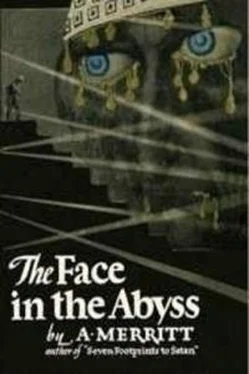
![Абрахам Меррит - Лунный бассейн [Лунная заводь]](/books/20623/abraham-merrit-lunnyj-bassejn-lunnaya-zavod-thumb.webp)
